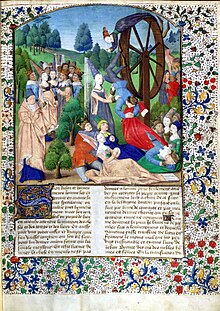This article has multiple issues. Please help improve it or discuss these issues on the talk page. (Learn how and when to remove these messages)
|

In medieval and ancient philosophy, the Wheel of Fortune or Rota Fortunae is a symbol of the capricious nature of Fate. The wheel belongs to the goddess Fortuna (Greek equivalent: Tyche) who spins it at random, changing the positions of those on the wheel: some suffer great misfortune, others gain windfalls. The metaphor was already a cliché in ancient times, complained about by Tacitus, but was greatly popularized for the Middle Ages by its extended treatment in the Consolation of Philosophy by Boethius from around 520. It became a common image in manuscripts of the book, and then other media, where Fortuna, often blindfolded, turns a large wheel of the sort used in watermills, to which kings and other powerful figures are attached.